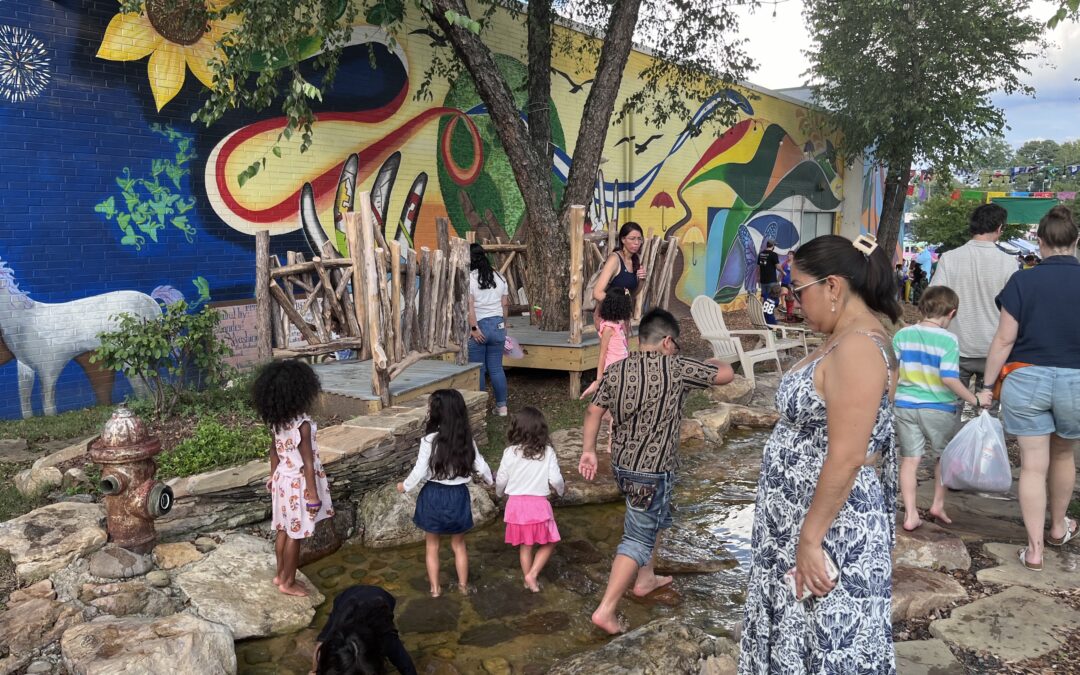“Over half of adults with mental illness in the U.S. receive no treatment—and the shortage of mental health professionals means that gap is only growing.”
— National Alliance on Mental Illness (NAMI)
Anyone who has accessed mental healthcare for themselves or a loved one knows that demand for services continues to rise, yet access remains limited—especially in underserved communities. At El Futuro, we’ve been asking ourselves a critical question: How can we get more care to more people? That question sparked a reimagining of how we deliver services—and has led us to develop a more accessible, sustainable model of care: stepped care.
For years, our focus was primarily on direct clinical treatment. But as we piloted programs like Community Engagement and Case Work, we began to explore the possibilities of preventative care through stepped care.
The beauty of stepped care lies in its efficiency and inclusivity. By training and employing individuals earlier in the mental health workforce pipeline, we can hire more people, serve more clients, and reduce costs—without compromising care.
Since 2023, this reimagining of mental health care has led to the creation of our Community Mental Health Worker (CMHW) model—a grassroots approach that meets people where they are, before crisis hits.
Programs like Mentes Fuertes (with our Community Mental Health Workers) show strong results under this model. Highly trained clinicians remain essential for complex cases, but with stepped care, they can focus on those needs while transitioning stabilized clients back to CMHWs for ongoing support.
This isn’t just a local solution—it’s part of a global shift. Community-based roles like CMHWs and Peer Support Specialists (PSSs) are proven strategies worldwide. In contrast, the U.S. continues to spend the most on healthcare while seeing some of the poorest outcomes. Our model reflects a desire to learn from global best practices—and to become a hub for training others to do the same.
Shifting to a systematized, demand-responsive approach requires innovation, courage, and collaboration. While change can be intimidating, it also holds the promise of greater sustainability and deeper impact. And through it all, El Futuro remains committed to trauma-informed, culturally responsive care at every level.
We believe stepped care isn’t just a strategy—it’s a movement toward equity, access, and lasting community wellness.

This graphic shows El Futuro’s approach to the Stepped Care model and how there are crucial roles to play at every stage of wellness to ensure that our community is strong and thriving.


 Alvely Alcántara, LCSW
Alvely Alcántara, LCSW Rossy C. Garcia, MEd
Rossy C. Garcia, MEd  Katy Sims, MD
Katy Sims, MD  Everardo Aviles, LCSW, LCAS (Eve)
Everardo Aviles, LCSW, LCAS (Eve) As a medical anthropologist and social work researcher, Dr. Gulbas’ research embodies interdisciplinarity through the integration of applied theories of health and human development with qualitative and ethnographic methodologies. Her work seeks to understand how people—children, families, and providers—navigate complex sociocultural landscapes in the pursuit of mental health. Most of her work, to date, focuses attention on developing more robust interpretations of suicide risk. With funding from the National Institutes of Mental Health, this body of research has contributed to advancements in theoretical and empirical knowledge of the broader contexts within which youth suicide risk is situated.
As a medical anthropologist and social work researcher, Dr. Gulbas’ research embodies interdisciplinarity through the integration of applied theories of health and human development with qualitative and ethnographic methodologies. Her work seeks to understand how people—children, families, and providers—navigate complex sociocultural landscapes in the pursuit of mental health. Most of her work, to date, focuses attention on developing more robust interpretations of suicide risk. With funding from the National Institutes of Mental Health, this body of research has contributed to advancements in theoretical and empirical knowledge of the broader contexts within which youth suicide risk is situated.  R. Gabriela Barajas-Gonzalez is a developmental psychologist and an assistant professor of Population Health at NYU Grossman School of Medicine. Dr. Barajas-Gonzalez is the principal investigator of a study that examines the impact of immigration-related threat and stress on school communities. She earned a PhD in developmental psychology from Columbia University and hold a BA in human biology from Stanford University. Dr. Barajas-Gonzalez is the daughter of Mexican immigrants and a first gen college student.
R. Gabriela Barajas-Gonzalez is a developmental psychologist and an assistant professor of Population Health at NYU Grossman School of Medicine. Dr. Barajas-Gonzalez is the principal investigator of a study that examines the impact of immigration-related threat and stress on school communities. She earned a PhD in developmental psychology from Columbia University and hold a BA in human biology from Stanford University. Dr. Barajas-Gonzalez is the daughter of Mexican immigrants and a first gen college student. Dr. Parra-Cardona is an Associate Professor in the Steve Hicks School of Social Work (SHSSW) at the University of Texas at Austin. At the SHSSW, he serves as Coordinator for Mexico and Latin American initiatives. He also serves as Area Director for Research at the UT Austin Latino Research Institute. Dr. Parra-Cardona’s program of research is focused on the cultural adaptation of evidence-based parenting interventions for low-income Latinx populations in the US and Latin America.
Dr. Parra-Cardona is an Associate Professor in the Steve Hicks School of Social Work (SHSSW) at the University of Texas at Austin. At the SHSSW, he serves as Coordinator for Mexico and Latin American initiatives. He also serves as Area Director for Research at the UT Austin Latino Research Institute. Dr. Parra-Cardona’s program of research is focused on the cultural adaptation of evidence-based parenting interventions for low-income Latinx populations in the US and Latin America. Bianka Reese, PhD, MSPH is a research scientist and program evaluator specializing in adolescent and young adult sexual and reproductive health. Her previous research in the experiences of Latinx LGBTQ+ youth stems from her work as the Research and Evaluation Manager at SHIFT NC (Sexual Initiatives For Teens), where she led largescale evaluations of multilevel, community-based sexual health promotion initiatives and research projects aimed at elevating the voices of diverse youth in North Carolina. Dr. Reese is currently the Senior Research Strategist at Creative Research Solutions, LLC, an award-winning national evaluation, research, and assessment firm.
Bianka Reese, PhD, MSPH is a research scientist and program evaluator specializing in adolescent and young adult sexual and reproductive health. Her previous research in the experiences of Latinx LGBTQ+ youth stems from her work as the Research and Evaluation Manager at SHIFT NC (Sexual Initiatives For Teens), where she led largescale evaluations of multilevel, community-based sexual health promotion initiatives and research projects aimed at elevating the voices of diverse youth in North Carolina. Dr. Reese is currently the Senior Research Strategist at Creative Research Solutions, LLC, an award-winning national evaluation, research, and assessment firm. Tania Connaughton-Espino, MPH is an independent researcher focused on adolescent and young adult sexual and reproductive health. Her interest in the experiences of Latinx LGBTQ+ youth stems from her previous work with SHIFT NC (Sexual Initiatives For Teens), where she led the training and evaluation department, conducted capacity-building workshops for youth serving professionals including on the topic of how to be more affirming of LGBTQ youth, and from her extensive experience working with the Latinx population in NC.
Tania Connaughton-Espino, MPH is an independent researcher focused on adolescent and young adult sexual and reproductive health. Her interest in the experiences of Latinx LGBTQ+ youth stems from her previous work with SHIFT NC (Sexual Initiatives For Teens), where she led the training and evaluation department, conducted capacity-building workshops for youth serving professionals including on the topic of how to be more affirming of LGBTQ youth, and from her extensive experience working with the Latinx population in NC. Maru Gonzalez, EdD is an Assistant Professor and Youth Development Specialist in the Department of Agricultural and Human Sciences at North Carolina State University. Her areas of inquiry include youth development with a focus on activism, social justice, and the experiences of LGBTQ+ young people across familial, school, and community contexts.
Maru Gonzalez, EdD is an Assistant Professor and Youth Development Specialist in the Department of Agricultural and Human Sciences at North Carolina State University. Her areas of inquiry include youth development with a focus on activism, social justice, and the experiences of LGBTQ+ young people across familial, school, and community contexts.  Nayeli Y. Chavez-Dueñas, PhD
Nayeli Y. Chavez-Dueñas, PhD Hector Y. Adames, PsyD
Hector Y. Adames, PsyD